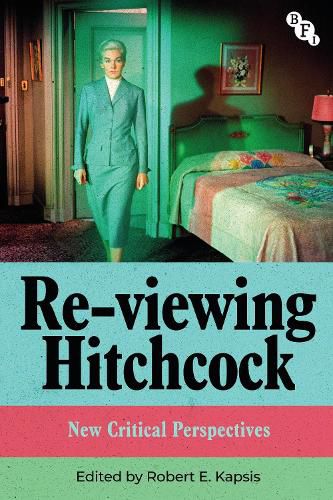Readings Newsletter
Become a Readings Member to make your shopping experience even easier.
Sign in or sign up for free!
You’re not far away from qualifying for FREE standard shipping within Australia
You’ve qualified for FREE standard shipping within Australia
The cart is loading…






Re-viewing Hitchcock approaches Alfred Hitchcock's prolific career in film and television from a reception focus, charting the changing fortunes of the master auteur's work from 1926's silent The Lodger to his penultimate film, the controversial Frenzy of 1972.
Each of the chapters, written by eminent international film scholars, critics and historians, offers a detailed analyses of the historical reception of key Hitchcock films. These include films that have enjoyed consistent critical success, such as Rebecca (1940), Rear Window (1954), and North by Northwest (1959), as well as those that have received shifting degrees of critical and scholarly praise, such as Sabotage (1936), Rope (1949), Strangers on a Train (1951), Vertigo (1958), Psycho (1960), and The Birds (1963). The contributors assess the significance of these changing critical perspectives and the extent to which they influence the meaning and significance of Hitchcock's films and filmmaking.
The book also sheds light on Hitchcock's lesser-known television work of the 1950s and the 60s, reassessing its relationship to his film career. In addition, it expands the focus beyond Anglo-American contexts to consider how Hitchcock's films have been received and interpreted in Europe, Latin America, and Asia.
$9.00 standard shipping within Australia
FREE standard shipping within Australia for orders over $100.00
Express & International shipping calculated at checkout
Stock availability can be subject to change without notice. We recommend calling the shop or contacting our online team to check availability of low stock items. Please see our Shopping Online page for more details.
Re-viewing Hitchcock approaches Alfred Hitchcock's prolific career in film and television from a reception focus, charting the changing fortunes of the master auteur's work from 1926's silent The Lodger to his penultimate film, the controversial Frenzy of 1972.
Each of the chapters, written by eminent international film scholars, critics and historians, offers a detailed analyses of the historical reception of key Hitchcock films. These include films that have enjoyed consistent critical success, such as Rebecca (1940), Rear Window (1954), and North by Northwest (1959), as well as those that have received shifting degrees of critical and scholarly praise, such as Sabotage (1936), Rope (1949), Strangers on a Train (1951), Vertigo (1958), Psycho (1960), and The Birds (1963). The contributors assess the significance of these changing critical perspectives and the extent to which they influence the meaning and significance of Hitchcock's films and filmmaking.
The book also sheds light on Hitchcock's lesser-known television work of the 1950s and the 60s, reassessing its relationship to his film career. In addition, it expands the focus beyond Anglo-American contexts to consider how Hitchcock's films have been received and interpreted in Europe, Latin America, and Asia.